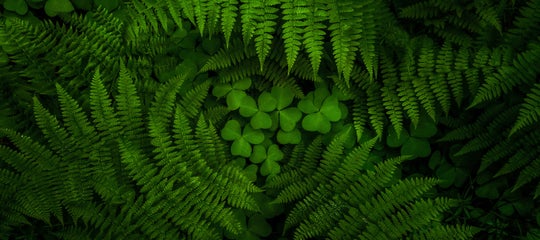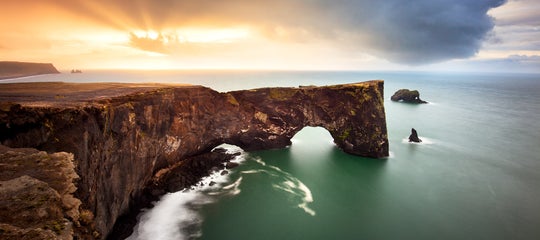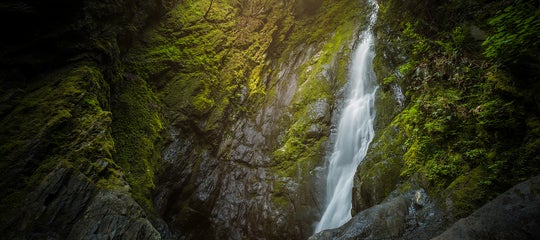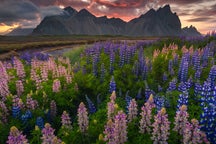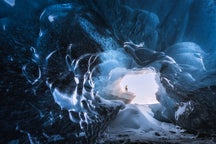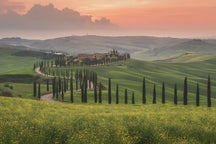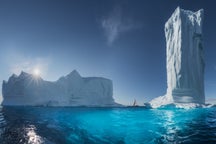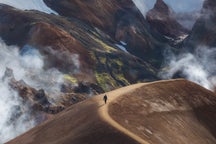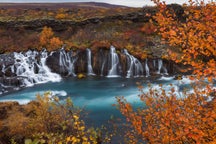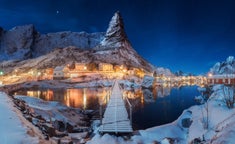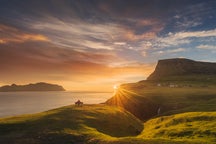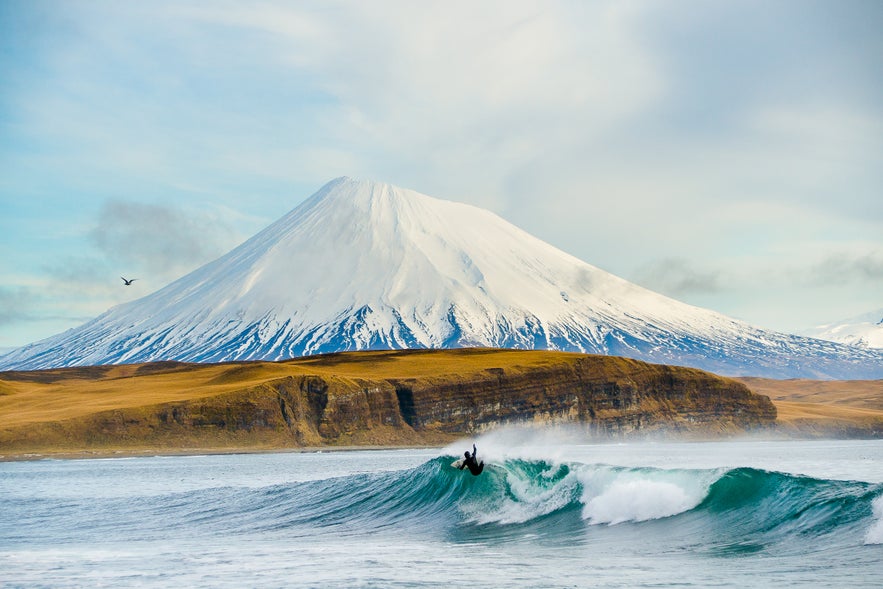
If you've ever seen the visionary works of Chris Burkard, then you'll know that he is a photographer like no other. Based in the USA, this accomplished explorer wears many hats, including that of a creative director, speaker and author.
Well-known for his work in the realms of outdoor, travel, adventure and surf photography, Chris' work transcends that of being an influencer. His conservation initiatives speak for themselves as he draws attention to the fragility of nature on Earth. This month, we spoke with Chris about his background in photography, storytelling and his passion for the ocean.
 Northern Lights and the surf. Photo by: 'Chris Burkard'.
Northern Lights and the surf. Photo by: 'Chris Burkard'.
- Check out these Antarctica Photo Workshops
- Explore these articles on Wildlife Photography
- Discover this Namibia Wildlife Photography Tour
Hello Chris and thank you for joining us. Were you formally educated in photography, or are you self taught?
Hello! I was not formally educated. I got into photography at the age of 19 and soon found myself shooting surf as I really enjoyed exploring and adventure. I landed an internship with TransWorld Surf magazine and learned so much through trial and error. So no, no formal training – I learned it all the hard way and discovered my own style through countless clicks of the shutter.
Tell us a bit about your career path. How did you get from being an aspiring photographer to actually doing it full time, for a living?
At 19, I enjoyed photography but the idea of turning it into career was overwhelming. I knew I had to give it 100% if I wanted to make it into something, so without any formal training, I quit my job (at a magazine store) and started shooting anything for anyone..
I would go and shoot surfers at the local beach and try to sell them pictures on DVDs... I shot weddings and senior pictures and interiors store photos. That obviously wasn't my end goal but I had to start somewhere.
I wanted to learn more about action sports and landscapes photography which is what I was excited about but didn't know where to turn, so I started applying for internships. I finally got an opportunity to intern with Michael Fatali, a large format landscape photographer, and I got an internship at Transworld Surf Magazine, which was an incredibly valuable experience.
Through trial and error, I taught myself and began to develop a style. Hard work, persistence, and having passion for what I do has taken me a long way. For the first part of my career, I slept in my car a lot, so nothing happens quickly. I would say it was about 4 years until I really started making an income.
During my Transworld internship, I commuted 5+ hours every week and lived in my car. I really look back fondly at those more challenging times because it makes you appreciate having to work for what you have and giving something of yourself for your career.
 The surf is a passion for Chris. Photo by: 'Chris Burkard'.
The surf is a passion for Chris. Photo by: 'Chris Burkard'.
Where do you find your inspiration and have there been any photographers who have influenced you upon your career path? Did you have a mentor in your early years?
Interning with Michael Fatali early in my career taught me a deeper understanding of dedication to my craft and how being patient for the right moment is so important nowadays. Due to the nature of some of my shoots, we catch ourselves running around trying to shoot as much as we can in a short amount of time. Fatali really inspired me to have the patience and willingness to take my time to line up my shot and become a part of the photograph. Guys like Pete Taras, Joe Curren, and Ron Stoner are also incredible and have helped me become who I am today.
These days, I find inspiration in a lot of different places. I feel equally inspired by art, music and even architecture. I find inspiration in nature. Heading out and spending days off the grid and away from civilisation is where I feel most relaxed and can really see things in a different light.
What do you wish you had known before taking your first photography job?
If you decide to pursue it as a career, know that 50% of photography is the business side of things. Emails, outreach, marketing, etc. are absolute necessities that can be tough to begin with, but will enable you to do what you love.
Keep exploring, follow your passions and photograph what you love. In the beginning, you may need to also photograph things that don't particularly interest you in order to fund what you want to shoot, but eventually you'll be able to focus in on your passions.
Be good to people, make connections, be honest and work hard. Promote yourself, and share your work.
 Photograph what you love. Photo by: 'Chris Burkard'.
Photograph what you love. Photo by: 'Chris Burkard'.
How would you define your personal style of photography?
Lighting and composition are, of course, extremely important. For me personally, natural lighting is everything in my photographs.
In most of my photos, I have a pulled-back composition, so I can show the whole environment. It is important for me to have a well-composed foreground, a subject in the middle ground, and an epic background to tie the whole image together.
I am usually shooting into the sun, towards a mountain range, or into something monumental. I want to transport the viewer directly to where I am shooting so that they get lost in the picture.
Which has been your favourite photography location to shoot in and why?
Iceland! No doubt. It's such a magical place and no matter how many times I go there, I keep getting drawn back. I’m about to go back for my 38th trip and am just as excited as I was on my first trip. The key is to go where people aren't, which is pretty easy. You just venture to the locations that aren't on the tourist trail. It’s an amazingly diverse country but I cringe when people just stay in Reykjavik and only explore a couple hours from the main city. The country has so much to offer if you just get out there and explore!
 Get out there and explore. Photo by: 'Chris Burkard'.
Get out there and explore. Photo by: 'Chris Burkard'.
How do you get the scene in front of the camera to look just the way that you want?
I think It’s a mix of some pre-visualisation and letting things happen in the moment. With how remote the locations these shoots take place at, there’s obviously a ton of research that goes into planning the trip. So I generally have an idea of how certain scenes will look in my head but the moments that end up being the most memorable are the ones that happen naturally.
How do you get your final images to look so consistent? How much editing do you do to your photos?
The reality is that all images you see now are edited, it’s a totally necessary although frustrating thing. I wish it was as easy as taking images and sharing them with the world, unfortunately it isn't. But I try and stay away from heavy-handed edits and Photoshop. Pretty much all the edits I do in the studio revolve around getting images to how they were perceived with the human eye when they were taken.
 Chris' photos are a mix of pre-visualisation and letting things happen in the moment. Photo by: 'Chris Burkard'.
Chris' photos are a mix of pre-visualisation and letting things happen in the moment. Photo by: 'Chris Burkard'.
What kind of technology, software or camera gear do you use to produce your work?
I shoot with the Sony mirrorless systems. I have shot with Canon, Nikon and Sony in the past 11 years and have settled on what I believe to be the best system available for lightweight travel and astrophotography.
I typically use the Sony A7RIV for about 70% of my work. The Sony A7SII is what I shoot for my night and astro images. This camera was built for sensitivity at high ISO. The A7RIV is my go to for commercial work, the R stands for Resolution and provides unparalleled reproduction for large prints and clients needs.
When I want to strip down and go super light, I use the Sony a6500 as well as when shooting in the water. This camera is perfect for sports photography, hiking, climbing and anytime you need to be weight conscious.
For post processing, I always use Adobe Lightroom.
 Identify a style that suits you and develop within it. Photo by: 'Chris Burkard'.
Identify a style that suits you and develop within it. Photo by: 'Chris Burkard'.
Do you have any advice for beginners about developing their own style?
The best thing that you can do as an aspiring photographer is to identify a style that represents you well, develop within that style, and keep shooting to perfect it. It’s super important to have your images be recognisable by editors and others who are looking at your work. With the large number of photographers that are out there now, you must find ways to stand out.
The best compliment I can ever receive is when people know my photography work instantly when they see it. Diversification in your work is great, but it’s important to remember that often, you are hired by a client or a magazine because you are a specialist at something. That is a good thing! It’s good to be known very distinctively for something and it’s a great way to get your name out there.
Start with what you know and only put the work out there you are truly proud of and willing to show the world. Then work on the other aspects and over time, they will be at the same quality. If you are great at one thing and mediocre at many others, it often drags down the great work in your portfolio. I have spoken to many editors about this and it’s one of the things that I have heard over and over again.
 Get out of your comfort zone to explore. Photo by: 'Chris Burkard'.
Get out of your comfort zone to explore. Photo by: 'Chris Burkard'.
Exactly what is it that you want to say with your photographs? How do you actually get your photographs to do that?
My hope is that my photographs allow people to gain a deeper appreciation for amazing places around the world, inspire them to care about our planet, and hopefully get them out of their comfort zone to explore and experience it on their own first hand. I think that’s probably the most rewarding part for me.
I don't think I would be half of who I am without traveling. It broke down my ego and my pride and made me see a world that was well outside the small town I grew up in. If there’s one thing I want people who see my pictures to do, it would be to travel.
To do this, I try and capture my environment as close to what’s reality as possible so that others can get a taste of it. At the core of all my photographs is story. People love to see beautiful places, but what they love even more is hearing a story about it. Those lifestyle, behind the scenes photos really bring the trips full circle. They make the epic photos more tangible and my audience is inspired to go out and do it themselves!
 Chris is passionate about the ocean. Photo by: 'Chris Burkard'.
Chris is passionate about the ocean. Photo by: 'Chris Burkard'.
What motivates you to continue taking pictures?
In the beginning, it was all about collecting a pay cheque and getting stamps in my passport, but at a certain point, that doesn't really amount to very much. I realised that I wanted to share stories with my friends and family. A lot of people who never travelled and made a lot of sacrifices for me to do so. I guess they are what motivate me the most.
Do you have any projects that you are working on at present?
There are a couple of remote Russian Islands I have my eyes on that I want to visit. Additionally, I have a book about Iceland’s glacial rivers, and a new film project that I've set my eyes on!
What are you passionate about besides photography?
The Ocean, and everything that has to do with it. I go on these long trips, and most of the time, I find myself just craving the ocean; always wanting to get back home to go bodysurf and smell the salt air.
It’s kind of an addiction in some ways. I never leave for trip without a pair of fins and board-shorts just in case I get a chance to jump in the water somewhere.
I also love lending my voice to protecting wild places. This is intertwined with my career as a photographer but something I’m highly passionate about as well.
 There are many places to explore in Iceland that are not well-visited. Photo by: 'Chris Burkard'.
There are many places to explore in Iceland that are not well-visited. Photo by: 'Chris Burkard'.
What do you do in your free time?
I try to spend as much time as possible being around my family. Being on the road so much, when I’m home, this is always the priority. Going to the beach, climbing, small road trips up to Big Sur, and day hikes are regular around here. There’s nothing better than spending time with my kids.
What tips or advice do you have for other aspiring photographers?
Besides constantly shooting to improve your portfolio, my best advice would be to find a professional photography company and try to intern/assist them in any way possible. Being exposed to the business side of the industry will give you a huge leg up as you progress in your own photography. Being able to see how a professional handles jobs, goes through their workflow and ultimately, how they make money doing what they love, is a huge help.
What is your next goal in photography?
Future goals are always to simply inspire people. Create work that is meant to last a lot longer than I am. I always hope to continue exploring parts of the globe that feel wild and remote and ideally bring those experiences back to people through social media, books, films and articles.
For more information on Chris Burkard's work, you can visit his website or find him on Facebook and Instagram.
Follow in Chris' footsteps as a travel photographer! Check out our range of international photo tours and photography workshops.


